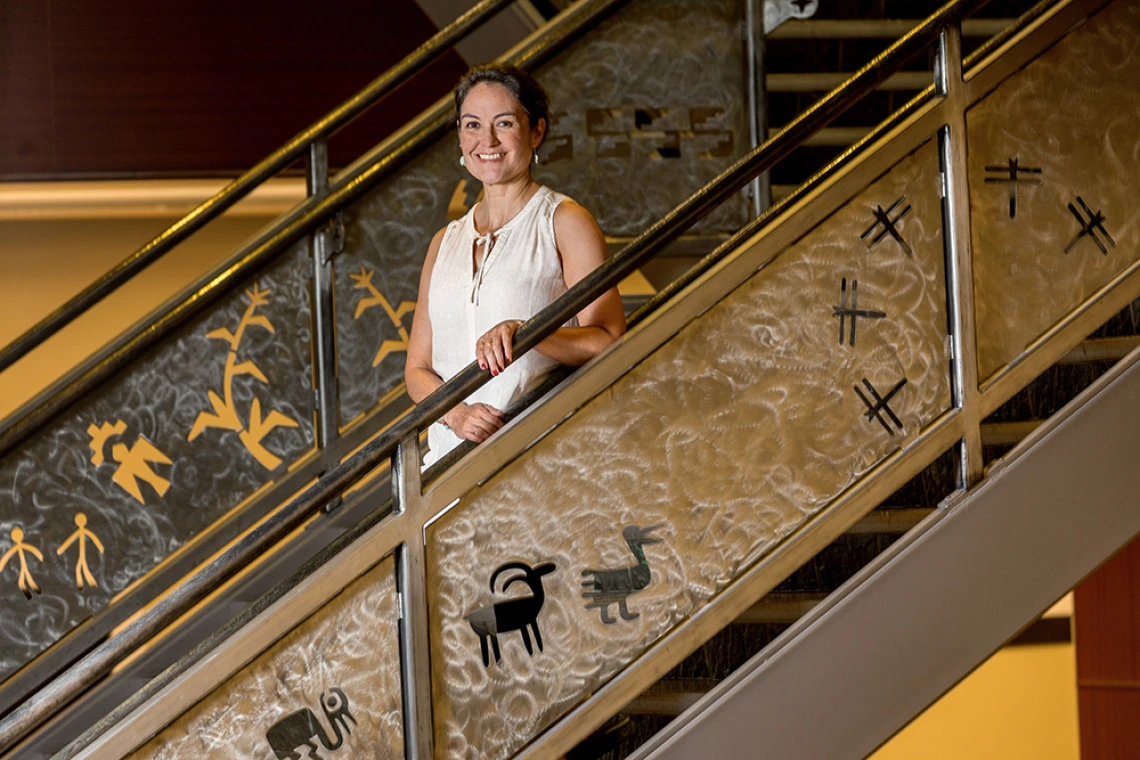Storytelling as a Way of Life
President Joe Biden announced on Oct. 5 his intent to nominate University of Arizona alumna Shelly Lowe to serve as chair of the National Endowment for the Humanities. Lowe is currently a member of the National Council on the Humanities, an appointment she received from President Barack Obama. If confirmed by the Senate, Lowe will be the first Native American and second woman to lead the NEH.
The following story about Lowe appeared in the fall 2021 issue of the Arizona Alumni Magazine.

When Shelly C. Lowe ’97 ’05 was a freshman, failing calculus changed her life.
She had grown up on the Navajo reservation, in Ganado, Arizona, and earned the honor of being Arizona’s first Native American Flinn Scholar. When she arrived on the University of Arizona campus, her new home didn’t feel like home at all. The people were strange, and the land was hot.
“I hated it. It was such a different environment and lifestyle,” Lowe says. “People were very loud.”
Education in rural Ganado hadn’t prepared Lowe for calculus, let alone the rigors of college life. Lowe says she couldn’t wrap her head around why someone like her, a Flinn Scholar and a top-20 high school student, was struggling to figure out how to be a college student.
The experience led her to take time off after her first year. When she returned, she got straight A’s, but not without self-doubt.
“It made me mad, and that’s why I went into the work I do,” she says.
Lowe earned a bachelor’s degree in sociology with a minor in American Indian studies, then went on to earn a master’s degree in American Indian studies. She is now the executive director of the Native American Program at Harvard. Her work supports Native students, faculty and programs. She was recruited away from Yale, where she was assistant dean for Native American Affairs.
“Students from rural and reservation areas may come out of school systems that are essentially good, but many aren’t prepared to do college-level work,” Lowe says. “They need advisers to nudge them.”
At UArizona, Lowe was mentored by Mary Jo Tippeconnic Fox ’82, Ph.D., who connected her to a sense of community in American Indian studies.
“There were so many Native mentors and faculty who created a welcoming atmosphere for Native students,” Lowe says. “When I was an undergrad, U of A had the premier Native academics in the country. We were one of two Ph.D. programs. It was a really, really special time.”
American Indian studies helped Lowe maintain her identity. She also took three semesters of Navajo language, which she says supported her health — mental, physical and spiritual.
“It might be difficult to explain the way Native languages talk about who you are as a person. There are many things that go into this idea of ‘person,’ and the language captures it so well,” she says. “The nice thing about continuing it at a college level is you maintain that connection to the language when you’re outside of the community, when you’re at the institution.”
Most tribal cultures are oral cultures, and Lowe incorporates storytelling into her work today. She says stories are embedded in tribal life. Some tribes introduce special stories when you are a certain age or when you’ve achieved a certain goal.
When Native students leave for college, they’re removed from this familiar storytelling practice, and it’s comforting to encounter it in a new setting.
“In offices like mine, we have the opportunity to share stories from multiple tribal traditions,” Lowe says. “It keeps the teaching happening in a very nontribal atmosphere.”
Lowe believes that American Indian studies should be part of the curriculum for every university student.
“Every couple of months I run into somebody who doesn’t know that Native people still exist in this country. And I find that shocking. It’s just so hard to believe that people educated in this country have not been educated about Native people.”
She points to the excellence of the UArizona program in American Indian studies.
“You can see how Native people and lands are the foundation of land grant universities. And if you have that kind of foundation, but you’re not making Native education one of your priorities for all students, then what are you doing? It should be a part of the curriculum that every student learns.”
